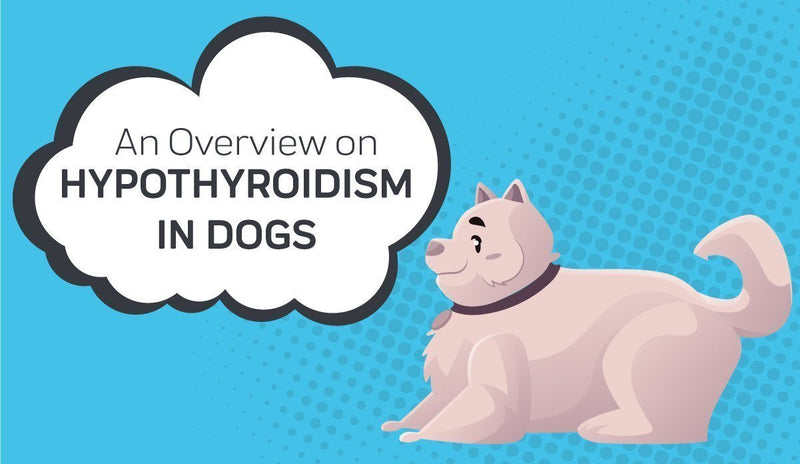- What is Addison's Disease In Dogs
- What Causes Addison’s Disease?
- Types of Addison’s Disease
- Breeds Prone To Addison’s Disease
- Symptoms and Clinical signs of Addison's Disease In Dogs
- How Stress Affects Addison’s Disease
- Treating Stress With CBD
- Addisonian Crisis
- Diagnosing Addison's Disease
- Preventing Addison’s Disease
- Slowly Reduce Steroid Dosage
- Treatment for Addison's Disease
- Managing Addison's Disease in Dogs
- Final Thoughts

It always takes you by surprise to hear that your pup has been diagnosed with a disease. It’s even worse when you have never heard about the disease before. Addison’s Disease in dogs is an uncommon disease that is unheard of to most pet owners, but it has a habit targeting a certain subsect of dogs. Addison’s disease can be quite dangerous and even fatal, but with early diagnosis and treatment, dogs with Addison’s disease can live a long and normal life.
What is Addison's Disease In Dogs
Addison’s disease, hypoadrenocorticism - is a medical condition where a dog's adrenal glands have difficulty producing hormones - notably cortisol and aldosterone. Adrenal hormones are vital to controlling the balance between the trifecta of water, sugar, and salt in the body.
Canine Hypoadrenocorticism can affect any dog at any age. However, it’s most commonly seen in young to middle aged female dogs around age four. Addison’s disease is rare in cats of all types.
Your dog can only develop Addison's disease if its adrenal glands are damaged. The symptoms of Addison’s disease vary in severity and can come on rather quickly. They are often confused for other less severe medical issues playing into the danger of the disease.
It’s hard to describe Addison’s disease in the same way we can with say allergies — which have very distinctive symptoms and causes. This is simply due to the nature of hormones and how they balance health. When a hormone becomes unbalanced itself it can affect health in a number of ways — both in big and microscopic ways.
Cortisol
Better known as the stress hormone, cortisol is vital to the management and metabolizing of sugar, protein, and fat in the body. It of course plays a significant role in stress but plays minor roles in tissue repair, memory formulation, and reducing inflammation.
Aldosterone
Aldosterone has many roles, but mainly it’s found in the kidneys where it aids in the conversation of sodium, production of potassium, stabilizes blood pressure and retains water. It has a small role, but not fully understood role in stress and the adrenal glands — anxiety increases aldosterone.
Cushing’s Disease
Cushing’s disease is more common in dogs than Addison’s, and it’s caused by an overproduction of cortisol unlike Addison’s which is a paucity of cortisol. Symptoms include increased thirst, appetite, and urination, along with elasticity and thin skin.
What Causes Addison’s Disease?
Autoimmune disease is the culprit in the vast majority of cases. Autoimmune disease happens when the body’s immune system attacks the body. In Addison’s disease, this assault happens on the adrenal glands — destroying the outer layer of the glands.
Cancer is another — a bit less common — culprit along with long-term infections like histoplasmosis or blastomycosis. These infections have been directly linked to cases Addison’s disease.
Another less common culprit is a pituitary gland disease which causes it to not produce the hormone ACTH. This hormone is directly linked to cortisol production, and this gives you more insight into how an unbalanced hormone can mess up so many tiny things.
Types of Addison’s Disease
There are three main types of Addison's disease: primary, secondary, and treatment-induced which a few other lesser known forms.
Primary Addison's Disease
Primary Addison’s disease is characterized by the adrenal glands completely shutting down and no longer working. This is the most common form of Addison’s disease in dogs as it's basically the destruction of the adrenal gland system.
Secondary Addison's Disease
Above we discuss how hormones balance one another and when one goes it can unleash a domino effect. Secondary Addison’s disease happens when the hormone ACTH — produced in the pituitary gland — ceases which will cause a scarcity in cortisol production. This happens because ACTH signals the adrenal gland and tells it to produce cortisol.
Treatment-Induced Addison’s Disease
The rarest form of Addison’s disease is treatment-induced. Iatrogenic Addison’s disease is usually a result of poor steroid usage. When used for extended periods, steroids need to be slowly reduced as a rapid cut-off can produce negative side effects such as Addison’s disease. Steroids will boost hormone levels allowing the adrenal glands to become “lazy” and not produce hormones themselves.
When we see a drug causes side effects, it’s our instinct to immediately withdraw all use of the said drug. But as you can see above this can be very dangerous, much more so than the side effect that causes you to discontinue use. As always talk to your veterinarian before making changes in your dog’s drug dosage.
Breeds Prone To Addison’s Disease
We don’t currently know why, but a few dog breeds appear to be more prone to developing Addison’s disease:
- Airedale Terrier
- Basset Hound
- Bearded Collies
- Great Danes
- Nova Scotia Duck Tolling Retrievers
- Portuguese Water Dogs
- Rottweiler
- Soft Coated Wheaten Terriers
- Standard Poodles
- Saint Bernards
- Springer Spaniels: English Springer Spaniel and Welsh Springer Spaniel
- West Highland White Terriers
It’s important to remember that any dog can develop Addison's disease, however certain breeds and females around age four are more at risk.
Symptoms and Clinical signs of Addison's Disease In Dogs
Weakness
Diagnosing Addison’s disease can be very tricky, but a dead giveaway is muscle weakness. This weakness is a direct result of dehydration due to a hormone imbalance so be on the lookout for that to help confirm the diagnosis. However, an increase of thirst and urination is also possible — though it’s more common to see these symptoms in Cushing’s disease.
Gasteroial
Imagine having all the gastrointestinal issues at one: stomach pain, no appetite, weight loss, vomiting, diarrhea. It isn't fun and that’s what can all happen at once to dogs with Addison’s disease.
More Symptoms:
- Appetite loss
- Changes in blood pressure
- Dehydrations
- Depression
- Diarrhea
- Not eating
- Slow heart rate
- Shaking
- Uncontrollable thirst
- Weakness
- Vomiting
In all cases, it’s important to know what’s normal behavior for your dog. Some dogs will hide their symptoms, and Addison’s disease symptoms are already tricky enough as is to diagnose.
How Stress Affects Addison’s Disease
One of the biggest clinical signs of Addison's disease is stress. Both pet owners and their dogs produce cortisol to help regulate and quell stress, so what happens when the body can’t produce cortisol? It can exacerbate all the other symptoms of Addison’s.
Even on a good day, a healthy dog is probably going to stress out or get anxious about something in some way. It feels like everything freaks out dogs: traveling, leaving the house, loud noises, celebrations, other dogs and people, and let’s stop there.
As you can imagine this makes life very difficult and stressful for a dog who no longer can produce the hormone that regulates stress. But don’t get your hopes up yet.
Treating Stress With CBD

Because treatment for Addison’s will likely include prescription medication, we wanted to offer an anti-anxiety solution that you can get over-the-counter. As well, it’s all-natural and has a very safe side-effect profile.
You’ve likely heard about lately as both people and pets are finding out that it’s having a startling effect on their anxiety levels. CBD supports and extends a vital regulatory system that helps balance the perception of anxiety. Since Addison’s disease severely hinders a major component of stress regulation, it’s a good idea to reinforce and boost other stress regulators that will now be working overtime to compensate.
CBD treats for dogs that are already taking pills or other medications as it breaks up the monotony. As well, who doesn’t want to spoil their dog with a tasty treat that may improve their health?
Addisonian Crisis
In most cases, Addison's disease will slowly sneak up on your dog. However, there is a rare chance it can rapidly appear with dangerous results. Acute adrenal failure, also known as an Addisonian crisis is the rapid onset of Addison’s. It can send your dog into shock and can be life-threatening. If you notice several of the following symptoms appear closely together — seemingly out of nowhere — immediately see emergency medical attention.
Symptoms of an Addisonian crisis dog:
- Confusion
- Low blood pressure
- High potassium (hyperkalemia) and low sodium (hyponatremia)
- Dehydration
- Delirium or lack of consciousness
- Extreme weakness
- Pain in the backend
- Stomach pain — diarrhea and nausea
Diagnosing Addison's Disease
Diagnosing dogs with Addison’s disease is not easy, and a series of tests are usually performed to narrow if Addison’s is the culprit. Addison’s symptoms mimic many other more common diseases. As such, the first series of tests your vet preforms will focus on ruling other more common diseases as Addison's is tough to get a definitive diagnosis.
ACTH stimulation test
Once everything else has been checked off, an ACTH stimulation test is performed to confirm there is an issue with the adrenal glands. Above you read how the pituitary gland naturally produces adrenocorticotropic hormones (ACTH) to stimulate the adrenal glands to produce cortisol. An ACTH stimulation test is an injection of ACTH which measures the degree to which the adrenal gland reacts when this test is performed.
As well, your vet may perform a dehydration test and will likely perform a blood test which will test for a number of imbalances:
- Anemia
- Blood urea nitrogen
- Chemistry profile
- Complete blood count
- Elevated creatinine
- Low blood sugar
Preventing Addison’s Disease
In most cases, there is little you can do to prevent Addison’s disease due to its genetic nature. However, Addison’s disease can be a result of a physical injury or drug-induced so we put together some helpful tips so you can keep your fur nugget safe.
Slowly Reduce Steroid Dosage
There are many reasons your vet may prescribe your dog steroids: pain, allergies, appetite stimulation, muscle weakness, adrenal insufficiency, etc. In most cases, steroids are only used short-term as long-term use greatly increases the risk of side effects. However, there are times when the extended use of them is required.
It is strongly recommended that you gradually reduce the steroid’s dosage over time, instead of dropping it cold turkey. Doing so can cause the adrenal glands to not fire back up to produce hormones since they were relying on the steroids to stimulate hormones.
Treatment for Addison's Disease
While difficult to diagnose and potentially life-threatening, Addison’s disease is fairly easy to treat. So what are the available medication for Addison's disease in dogs?
Well, there are two main drugs to choose from. Florinef (fludrocortisone) is the older of the two, however it is very effective. Even more effective is Percorten-V (DOCP) — it will require a steroid to achieve such however. Prednisone is typically the steroid prescribed, and we have a great article that will tell you all about the positives and negatives of prednisone.
Both drugs will hopefully achieve the same result, and that’s balancing your dog’s hormone levels. Your dog should be rechecked by your veterinarian 2-3 times a year to see if a change in dosage is needed.
If your dog is experiencing acute adrenal failure (Addisonian crisis), the emergency treatment protocol is administering intravenous fluid therapy which is typically a mixture of glucose and dexamethasone.
Managing Addison's Disease in Dogs
While it can come as a big surprise to hear your dog diagnosed with a rare and potentially life-treating disease, Addison’s disease is easily managed in most dogs. You’ll want to use the tips we given and be aware of the symptoms as early diagnosing will translate into your dog having the best chance at a happy and healthy life. All in all, if you notice that not all is well with your pup, trust your instincts, and don’t wait to call your vet.
Fortunately, the hardest part in managing Addison’s is sticking to a constant regimen which in the beginning will be weekly blood tests. However, after their hormones have stabilized, blood tests will only need to be done 2-4 times a year.
Final Thoughts

Thanks to modern medicine, managing and treating Addison’s is very effective — which is wonderful to see as once it spelled a death sentence. As well, by using an all-natural remedy like CBD for stress, we can potentially extend our hand in helping our pets have a healthier life. At Innovetpet this is what we love to see — harmony between modern convention medications and all-natural remedies. Where one picks up the slack of the other. In CBD's case, that’s extending the conventional medication used for Addison’s disease to also help with stress and anxiety.
This can make an already manageable disease even easier to treat. Remember, your most important job is to know the signs of Addison's disease in dogs and immediately contact your veterinarian if you see them.
Sources:
Addison's Disease
CBD Supporting Immune Responses
















